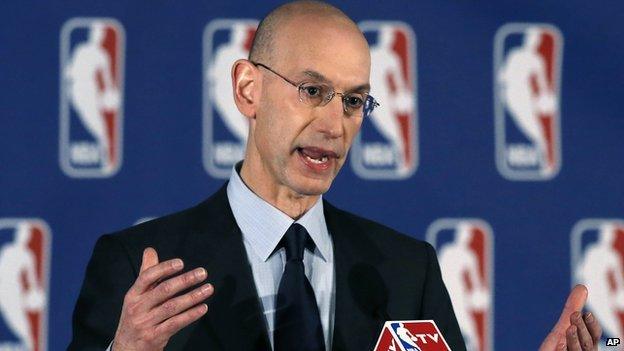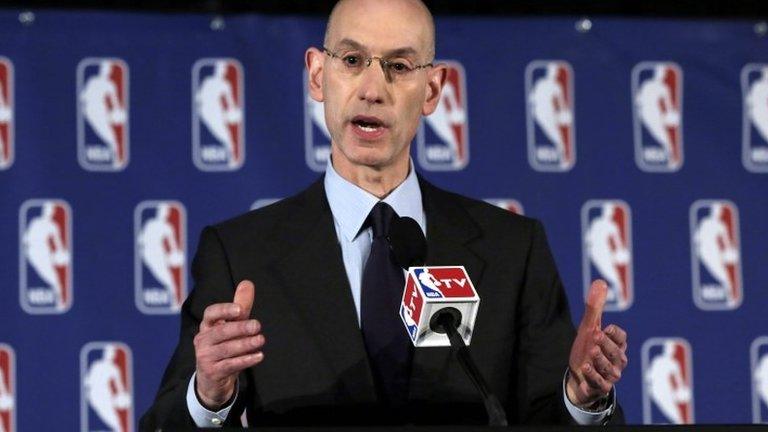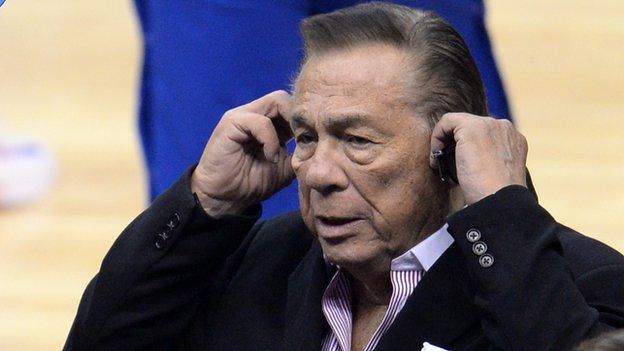A swift punishment, but is it a just one?
- Published
- comments

NBA Commissioner Adam Silver was praised by some for his "swift action"
A $2.5m (£1.5m) fine, a lifetime ban and the likely forced sale of his team.
That was the sentence handed down by National Basketball Association Commissioner Adam Silver on Tuesday in response to the secretly recorded racist statements of Los Angeles Clippers owner Donald Sterling.
Does the punishment fit the crime? The controversy has been at the centre of a media storm ever since the story broke over the weekend. Now commentators have been quick to offer their reaction to Mr Silver's decision.
"The punishment was beyond well-deserved," writes, external US News & World Report's Pat Garofalo. "And it's an encouraging sign that vile racism of the sort purportedly displayed by Mr Sterling (he has offered some half-defences) was met with such swift action, this time."
"Silver took the harshest step he could have possibly taken," writes, external Tony Manfred for Business Insider. "He deployed the nuclear option - banning Sterling for life and moving to force the sale of the Clippers."
"It's hard to overestimate just how bold of a move this was for Silver," he says.
Mr Silver could have taken a "half measure" and avoided the possibility that Mr Sterling would take the matter to court or he wouldn't be able to get the full backing of the other team owners, he writes, but he didn't.
"Silver went beyond what anyone expected, and won over everyone he could have ever won over in the process," he concludes.
The New Republic's Marc Tracy also praises, external the "swiftness and firmness" of Mr Silver's decision.
"He spoke with resolution and an amount of equivocation so small that not even a dog could sniff it out," he writes.
He notes, however, that the speed with which NBA players rallied to support the decision indicates that this was the only possible outcome.
"The NBA is not a democracy," he writes, external. "But as dictators have learned throughout history, even undemocratic governance requires a measure of consent from the governed."
As quickly as support of Mr Silver's announced punishment rolled in, the praise for Mr Silver's actions were far from universal. A common theme was a concern that the NBA's decision set a bad precedent, that private comments should not be grounds for public disciplining.
"It's not a First Amendment issue," tweets, external TruthRevolt's Ben Shapiro. "It's a 'do we want to live in a country where your private thoughts are cause for your destruction' issue."
He continues, external: "Now that Sterling's head is on a pike, can we can all go back to pretending that we defend privacy and views with which we disagree?"
Conservative radio host and columnist Larry Elder also took to, external Twitter: "Private thoughts + private recording = force sale of private property!!!"
Dan Calabrese, writing on former Republican presidential candidate Herman Cain's website, takes issue, external with the "process" used to punish Mr Sterling.
"The things Sterling said were, he thought, being said in private to a person with whom he had a personal relationship," he writes. "He did not know he was being recorded. It was not his intention to say them for public consumption. But they were leaked, and he is now being banned for the things he said - he thought - in private."
"Are you OK with that?" he asks. "Would you want to pay a price like this for the worst thing you ever said when you thought you were speaking in private?"
Who gets to decide what is "hurtful and offensive" he asks. And why did the investigation only take two days?
"We're getting way too quick in this country to simply bum-rush people out of their livelihoods because of a position they took or a thing they said," he says. "However big a racist jerk Donald Sterling may be, this is dangerous."
Jason Whitlock of the sports network ESPN joins, external this growing outcry among some conservatives:
In our zeal to appear righteous or courageous or free of bigotry, a ratings-pleasing mob hell-bent on revenge turned Donald T Sterling - a victim of privacy invasion and white supremacy - from villain to martyr.
He says Mr Sterling's "rights were violated", and he likely won't be the last to suffer this fate.
"Let's be careful here," he writes. "From the owner's box to the locker room, professional sports are overrun with wealthy men in complicated, volatile sexual relationships."
If "pillow talk" made public becomes grounds for punishment, he writes, "it won't be long before a parade of athletes joins Sterling on Ignorance Island".
He breaks with the conservative critics, however, when he writes that Mr Sterling is a product of a "culture of white supremacy", and getting rid of Mr Sterling isn't going to change anything:
The mainstream fanned the flames, enraging the angry black mob looking for a quick solution, a sacrificial lamb - and now, by the end of the week, we'll be back to business as usual, pretending the stoning of Sterling harmed the culture that created him.
Mr Sterling may be going away, but this story, it seems, is a long way from its conclusion.
- Published29 April 2014

- Published29 April 2014
